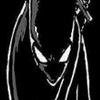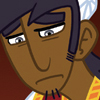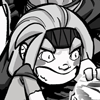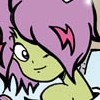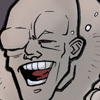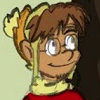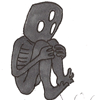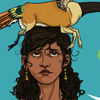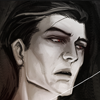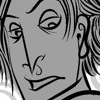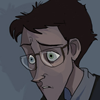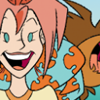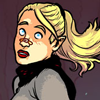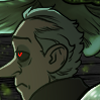Monthly Archives: June 2010
The Webcomic Overlook #126: Wendy Pini’s Masque of the Red Death

I became a comic fan in the early 90’s during the debut of Jim Lee’s X-Men. Thanks to my nerdy, obsessive nature, I ended up taking a strong interest in the history of comics. I used to hope up at the Detroit Public Library, head up the stairs to the second floor (which had some fantastic Diego Rivera murals that I didn’t appreciate at the time), and pored through various books about comic book history. I learned about obscure, now-forgotten heroes, reveled in pages devoted to Will Eisner’s The Spirit, and took a passing interest in the Kitchen Sink Comix movement of the 1970’s.
When the book got to the 80’s, a couple of names stood out prominently: the husband and wife team Wendy and Richard Pini. Their comic, Elfquest, was the standard bearer for indie comics of the 1980’s. It was THE sterling and unassailable example that creators didn’t need to sell their souls to the Big Two to create a comic book hit.
However, I never got into Elfquest much. I tried reading the books, which were also available in hardcover at the library, but they weren’t for me. I think the books were successful because they pursued the female comic reader market before manga proved to everyone that they were commercial viable. While a noble pursuit, these delicate fantasy comics filled with dewy-eyed pretty boys were definitely not for me, who longed for nothing more than to read page after page of muscly guys punching each other.

Still, I was filled with giddy excitement when, one day while browsing through the “webcomic” entry of Wikipedia, I ran across Wendy Pini’s name attached to an online adaptation of Edgar Allan Poe’s The Masque of the Red Death. Ah, I thought, the perfect gateway into the world of Wendy Pini! I loved Poe’s original short story, and I was excited to see how that would translate to comics.
Imagine my surprise when the webcomic bore less resemblance to Poe’s Masque of the Red Death and more similarities to Anne Rice’s The Claiming of Sleeping Beauty. That is to say that Rice, writing under the name A.N. Roquelaure, mainly used a well known story as a framework for erotic literature about bondage, domination, and sadomasochism.
In case it hadn’t bee quite clear to you yet, Wendy Pini’s Masque of the Red Death is similarly and adults-only affair. The review itself doesn’t really go overboard into NSFW territory, but, still, proceed at your own caution.

Storming the Tower: What I’ve Learned Reading Print Comics
Lauren Davis of the Storming the Tower webcomic blog has a great post she’s written called “What I’ve Learned from Reading Print Comics.” She recounts experiences from being a print comic fan, what advantages the format has over webcomics, and the areas the webcomic community needs to work on to capture the same zeitgeist.
Here are some highlights:
Reading comics should be a social activity. I don’t know why this surprised me, but it did; buying comics is a social activity. You head down to the shop on Wednesday afternoon — roughly the same time each Wednesday — and buy your books. You shoot the shit with other folks who buy their comics at the same time you do. You talk about the books you’re buying, this week’s True Blood, the weather, whatever. You see roughly the same people each week and, over time, you get to know their opinions on this artist or that character. I’m a pretty hermetic person, but even I think it’s kind of nice.
I’ve never found anything that’s quite analogous for webcomics. I have some friends IRL who read webcomics, but we don’t really critique webcomics in the same way print comics readers do. We don’t discuss Hazel’s role in Girls with Slingshots or how Randy Milholland handles other creators’ characters or whether Fans! makes any damn sense half the time. We don’t talk about the direction we’d like to see Questionable Content take or whether the titular character in Bruno is a Mary Sue and whether it matters.
Individual comics have comment sections or bulletin boards, and some of them are a lot of fun. I’ve probably spent more time reading Penny and Aggie’s board than reading the comic itself. But the reading community hasn’t developed a central place where it can discuss the wider ecosystem of webcomics. We have websites and blogs, but we’re not polishing ourselves against one another. With a few glancing exceptions, we’re not forming relationships with one another over our bickering and our shared admiration. We’re not elevating the discourse about webcomics. We’re not creating a central place for criticisms and small experiments and parodies. We’re not providing a social resource for newbies to the webcomics scene. We’re not even providing a scene outside the creative community.
I often tell people that webcomics are awesome because for every “two dudes playing video games on a couch” comic, there is a comic about post-Reformation theologians or karmically-challenged Brooklynites or a grumpy wombat on a mystical quest or the zombie post-apocalypse or an alternate-history Arizona or female professional wrestlers. There are artists who put out clean and polished lines, others who prefer to leave theirs sketchy, and still others who rely primarily on clip art. While traditional print comics wring their hands over girl power and attracting younger readers, webcomickers offer plenty of honest-to-God feminism and teen drama. Webcomics have something for everyone, assuming you know where to look.
But this also means that webcomickers have to identify their target audience, grab ’em by the ears, and pitch and market their little hearts out. DC and Marvel can lure us in with new stories about familiar characters, even if we didn’t grow up with superhero comics. You can bet I’ll pick up Batman Beyond #1 this week, if only because I loved watching the show so much in high school. Webcomickers have to say a lot more than “Hey, remember how awesome Terry McGinnis was?”
Sharing books beats sharing links. An interesting thing happened to me recently. My mom was visiting for a few days this month, and I showed her my copy of The Fart Party. She sat down, read most of the book, then left it on a chair in my living room. Fast forward a few days, and my law school roommate, a corporate litigator whose never expressed any particular interest in comics, is staying with me. I’m trying to get some work done when I suddenly look up and she’s sitting there reading the book she’s found on the chair.
“This is really funny,” she tells me. “Why have I never heard of her before?”
I am speechless.
This is more or less why I bought the Octopus Pie treasury. I’ve been trying to convince my comic and non-comic-reading friends alike of Meredith Gran’s brilliance, but when I send people the link, they assure me that they’ll “get around to it eventually.” As a person who has a lot of comics I plan to “get around to eventually,” I know exactly what that means. I got my copy of There Are No Stars in Brooklyn just two days ago, and I’ve already loaned it out. Giving someone a physical book to read adds a little weight to your recommendation (about two pounds — har, har), and gives your bailee a ticking clock. They have to read your book so they can return it to you. Just make sure you can trust the person you’re loaning it to — those things aren’t cheap.
Random Quickies: Letters to an Absent Father

Cartoonist Maré Odomo wrote a video game webcomic. Which makes it perhaps generic. But it’s about an absent father. Which is very, very sad. Except it stars Ash from Pokemon. Which makes it very, very funny. Read Letters to an Absent Father, which must be seen to be believed.
The Webcomic Overlook #125: Bottle of Awesome

If Andy Belanger’s Bottle of Awesome has anything going for it, it’s got a helluva title.
Not that calling anything “awesome” makes it immediately… uh… awesome. If you inflect the pronounciation wrongly, like by giving it a high pitched sing-song sound and drawing out the last syllable, you tend to sound like something the odious comic relief character on a Nickteen show would say.
Additionally, you run the risk of sounding like a total tool. Hey, anyone remember the name of Rob Liefeld’s short-lived comic studio after he left Image? That’s right: Awesome Comics. Ugh. Say it out loud to determine how incredibly dorky it sounds. That’s, like, Poochie levels of trying to hard to sound cool. So not awesome.
Put into the right context, though, awesome can become a wonderful adjective that can substantially boost the semi-ironic quotient that you so desire in a competitive product. Who would want to read a comic called Bottle, for instance? English lit majors? Hell, that sounds like a depressing black-and-white indie comic about a man’s descent into alcoholism.
But affix of Awesome at the end, and you’re back in business. Someone can actually contain the essence of inspiring awe? And somehow it’s the adjective form and the not the noun (“awesomeness”)? Aw, snap… that’s my jam, son!
DC enters the world of online comics on the iPad
Robot 6 and Comics Beat are all over DC’s new app on the iPad/iPhone. (And, in one case, the PSP… holy crap, that thing still exists?) Not actually owning an iPad, I can’t say that this news affects me much (though I think I will download this for my iPod Touch tonight when I get the chance).
Notably, at least as long as this site is concerned, the app offers a few free comics — Batman Black and White, Superman #700 … and the Eisner-nominated Bayou, which I reviewed here and was my personal favorite of the nominees.
I (and others) have railed at the clunkiness of Zuda’s online Flash interface. Quote from Comics Beat: “Bonus: Now we can finally read Zuda comics without that horrible Flash interface, since Flash is to Apple mobile devices what garlic is to vampires.” I wonder, though … does Zuda play better through the iPad/iPhone app? Will the DC Comics app prove to be Zuda’s true home?
So, Captain Nihilist, if a comic is any good, why is it a webcomic?
Not too long ago, a reader put comments up on this site questioning the general quality of webcomics. I thought it would be good to respond via post not to pick on the guy, but because his point is one that’s been made may times by many people, whether they’re proponents of print comics or casual webcomic readers or what not.
“comics not good enough to end up in print” sounds about right. We’d like to think that some vitriol-filled, scathing reviews would improve any of these end products, but the fact is, that, yes, just as the internet is a wonderful library of information in which every piece of information you never wanted to see or have contact with is usually in the path to your goal, likewise good webcomics are incredibly difficult to come by, and even most of the review sites that claim to point toward the higher-quality work are sycophantic droolers.
….
… Penny Arcade and Chugworth and Megatokyo and other low-quality comics may have acheived print status, finally, but they’re still webcomics, and will always only ever be “webcomics.” They will be “comics not good enough to make it into print, who’ve found a wide and mediocre audience that will eat dog food if you serve it to ‘em, and through the powers of the internet, gathered this niche of chowder-headed buffoons and united them into a market that might actually buy the crappy book.” It serves two purposes. It tries to elevate them to the same status as any other book of newspaper cartoons you might find in the humor section, and it gives ‘em something pretty to sign at conventions, and we KNOW how much egomaniac artists and writers love to sign things.
I’m sure that I probably shouldn’t be taking this post too seriously. However, his views are neither wrong nor a minority opinion. There really are a lot of awful webcomics out there. If this blog were to ever to reflect the true depth and breadth of all the webcomics I’ve read, 90% of them would be filled with zero-star reviews. That’s right, those not even good enough to warrant a write up. Half of them have no right telling jokes, half of them have no right telling stories, and almost 100% of them should not pick up a pen or pencil or Wacom tablet without taking a basic cartooning class or at least reading How to Draw Cars the Hot Wheels Way first. ’tis only my pity for these misguided souls that stays my hand.

But does this mean that webcomics, as a whole, are thus inherently an inferior medium to print? Around the same time, I ran across a Wall Street Journal article entitled “Does the Internet Make You Smarter?” The article wasn’t specifically about webcomics. However, it did examine the total mediocrity of everything online. Think webcomics are the only thing plagued by awfulness? How about Youtube vs. television? Blogs vs. newsprint? The problem is everywhere.
The writer of the article, Clay Shirky, takes things one step further. He mentions that this is hardly the first time the world has seen such a phenomenon. He compares the modern digital revolution to the advent of the printing press.
Read the rest of this entry
Who Are You?: An interview with Ulysses “Seen”‘s Robert Berry
 Adapting a book to fit the comic/graphic novel/sequential art form is a fairly daunting task. So you’ve got to hand it to anyone for adapting one book which, on face value, doesn’t seem like a natural choice to lend itself to a comic adaptation: James Joyce’s Ulysses. Yes, the very same book that’s probably been the subject of the most “impenetrable novel” jokes outside of War and Peace. Who would dare such a foolhardy challenge?
Adapting a book to fit the comic/graphic novel/sequential art form is a fairly daunting task. So you’ve got to hand it to anyone for adapting one book which, on face value, doesn’t seem like a natural choice to lend itself to a comic adaptation: James Joyce’s Ulysses. Yes, the very same book that’s probably been the subject of the most “impenetrable novel” jokes outside of War and Peace. Who would dare such a foolhardy challenge?
Rob Berry, that’s who.
With Ulysses “Seen”, Berry bravely undertakes the task of adapting the 265,000 word novel for the internet. It turns out, though, that the webcomic form is but the first step. Recently, the Ulysses “Seen” app went live at iTunes, taking advantage of the latest in cutting edge technology to bring the acclaimed classic into the new Digital Age of Mobile Technology.
Lately, he’s been working on a new web-based media project with Gary Epting on Story Clouds, which will be seeing some fresh material following Bloomsday.
Rob and I got in touch via Twitter first and, after some rather enthusiastic exchanges, later by e-mail. I asked him about Bloomsday, his favorite scene from the novel, and his experiences with iTunes.
1.) So what is it you do on Bloomsday? Do you dress in any wacky outfits? Visit favorite haunts?
Well, I’m not much of a “dress-up-kinda-guy” but I do collect costume stuff for most of the projects I work on. Still got a full Captain America suit from a series of paintings I made 15 years ago. For Ulysses “Seen” I’ve been collecting hats just to get the look right. But I’d never wear them in public. Nothing says “art geek” like wearing a bowler on Bloomsday and, well, people get enough of that idea when the hear me talk. No sense broadcasting louder.
Berry’s Captain America Pagliacci
This Bloomsday I’ll be in NYC for a lot of fun Joycean events ending with Symphony Space’s 29th Bloomsday on Broadway. And I suspect there will be some drinking involved at some point as well.
2.) Is there any scene in Ulysses you could say stuck out to you or you could call your favorite?
There’s a moment when Mr Bloom is having his lunch and thinking about the first time he made love to his wife. Thinking about a picnic long ago on a hilltop, about them kissing and passing food to one another in that kiss, between there mouths, while he eats his own modest lunch now alone in pub. He knows his wife’s lover will visit her in few short hours and feels there’s nothing to be done about this. And he watches “stuck on the [window]pane two flies [buzzing], stuck.”
To me this one has always been a really vivid image that works exactly the way comix do and film does not. The idea of visual information combined through there juxtaposition but not necessarily connected in time.
3.) Joyce fans are pretty hardcore. What’s been the reaction of Joyceans to your adaptation — positive or negative?
Joyceans can be, in their own way, much more dogmatic than Trekkies. Cracking the code of Joyce’s puzzles within the book is tricky business, so really nuanced arguments prevail about what the author is really telling us. People feel an involvement with text once they’ve made it through and an investiture in telling others what they may’ve missed. It’s quite natural, really. There’s so much information in there for people to dig through.
But Joyce, plagued by terrible eye problems, is often cited as being a very “non-visual” writer. There aren’t a lot of flowery descriptive passages in there but a lot of room for argument. So most all of the comments I get from Joyceans are actually really a help to me for purposes of research. They really do know this novel waaaay better than I and I’d never be able to do it without their help and interaction.
That being said, I’d probably describe their reaction as “supportive but cautious.” Oh, and maybe “sometimes sermonizing.” Most want to encourage me in doing this, but also feel I’ll never make it or, worse yet, go horribly astray from the true path.
Read the rest of this entry
Kelly Thompson’s Ten Webcomics She Loves
Kelly Thompson, writer of the “She Has No Head!” column at the Comics Should Be Good blog, gives us her list of her ten favorite webcomics. It’s a nice mixture of old standbys like Hark! A Vagrant (reviewed here) and The Abominable Charles Christopher (reviewed here) as well as a few comics I’m hearing of for the first time, like See Mike Draw and Gronk A Monster’s Story. These tend to be aimed at readers who care more about characterization and care less about video game jokes.
Thompson also has a pretty fantastic intro to lead off her article, which perfectly summarizes how all of us feel about webcomics:
I have a love/hate thing with webcomics.
On the one hand there are some damn fine cartoonists and writers putting out some damn fine comics for free and what could be better than that? On the other hand there are about a zillion webcomics out there that are really really bad and it can be frustrating to sort through them to find the gems. Having done a webcomic myself for a year (a crappy journal comic that updated daily Monday through Friday no less…daily!) I know how hard it is to put out a quality piece of work on a regular schedule for free. Okay, I don’t know anything about quality – but I DO know about the schedule stuff and the free stuff and how time consuming and absolutely unrewarding it can be – but with no disrespect intended to any hard working creators out there – I think we can all agree that not all webcomics are created equal.
One of the great things that webcomics do offer readers – certainly more than mainstream comics in many respects – is a really wide variety – everything from single panel gag strips to journal comics to superhero comics. It’s all out there, nearly anything you can imagine and most of it is free…and in this new market of $3.99 for 32 freaking pages (and really that’s only 22-pages of story) it’s kind of mind blowing to see so many truly talented people essentially giving their work away for free.





